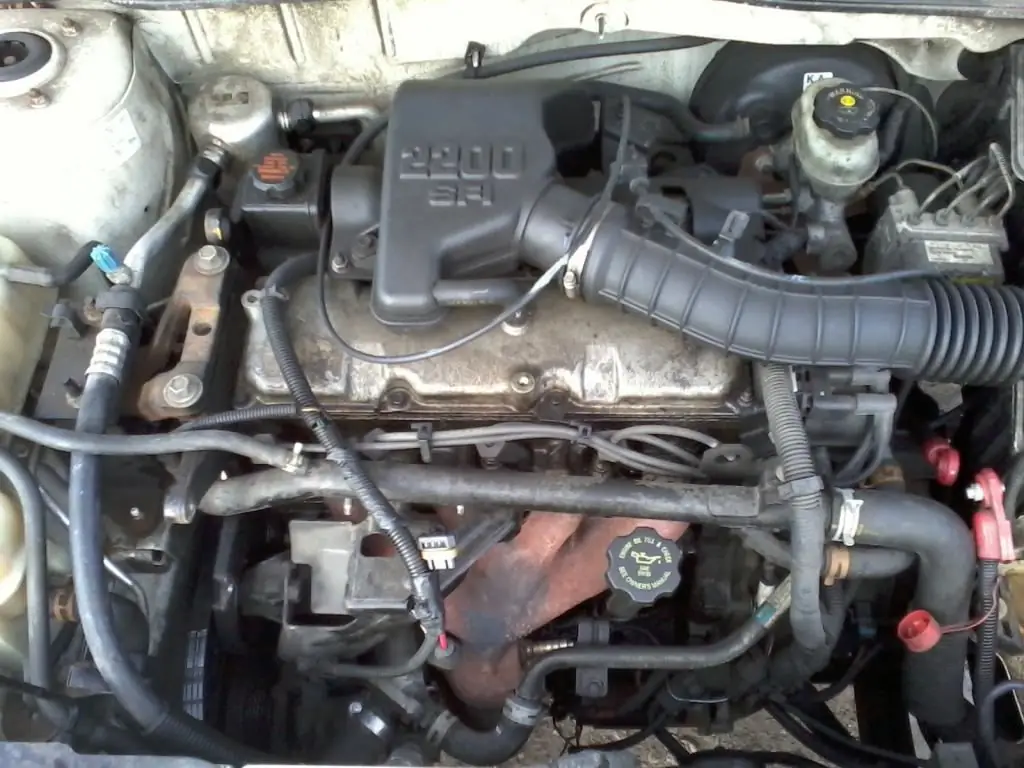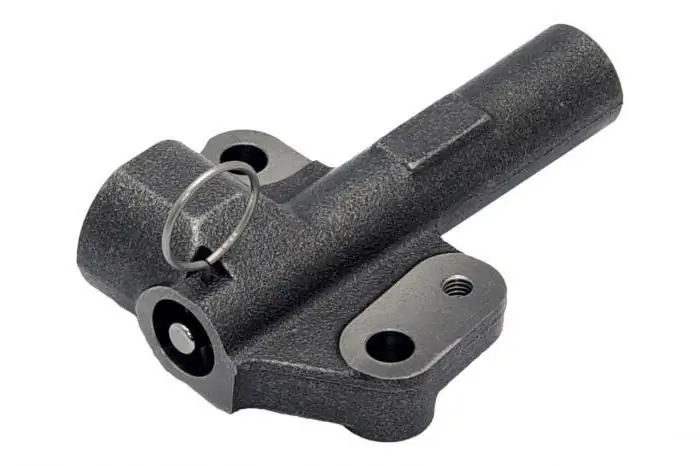2026 Author: Erin Ralphs | ralphs@carsalmanac.com. Last modified: 2025-01-22 21:14:09
As early as 20 years ago, a timing chain drive was installed on almost all machines. The use of toothed belts at that time caused confusion among many motorists. And no one could have thought that in a few years just such a design would be used on all modern cars. Manufacturers explain this by the fact that the belt, unlike the chain, is less noisy, has a simpler design and low weight. However, nothing lasts forever. What to do if the timing belt breaks? About this and more - later in our article.
Differences from chain drive
During operation, the chain drive practically does not wear out. It lasts as long as the engine itself. Yes, it is noisier, sometimes it stretches, however, unlike a belt, it will never slip or break. The chain must not be tensioned. In the case of a belt, it must be tightened periodically. And the wrong tension can provoke a skew onteeth. Because of this, the motor will not work properly, and the life of the element is significantly reduced.
Do the valves bend?
Among motorists, there is an opinion that if the Renault timing belt breaks, the valves immediately bend. Partly it is. But not always. It all depends on the complexity of the engine design. If this is a “shesnar”, there will definitely be a bend in the valves.

Cars with 2 valves per cylinder (intake and exhaust, respectively) are considered more reliable in this regard. But again, there are exceptions (take, for example, the Soviet "eight", 1, 3-liter carburetor). In the case of a chain, things are much simpler. She starts ringing loudly. And this noise can continue for quite a long time - one, two, three thousand kilometers. Until the car owner gets tired of this sound and comes to the conclusion that something is wrong here. The chain, unlike the belt, is very "tenacious" in this regard.
What does this lead to?
If your timing belt breaks, the consequences can be different. As we said earlier, it all depends on the design of the power unit. Here you can be guided by the principle "the simpler the motor, the more reliable it is." When the valve does not reach the piston crown on the engine at TDC, nothing will happen. In this case, if the timing belt is broken, only the purchase of a new product can be registered in the expense item. All valves will remain intact, without damaging the stem geometry.

But not always a belt break occurs with such an easy gathering. If your car has 2 intake and exhaust valves per cylinder (which is most pre-2000s cars), there's a good chance they'll be bent. The use of such a timing design is aimed at increasing power. However, if the timing belt breaks, the consequences will be very sad. In this case, the camshafts (of which there are two) stop in the position in which the breakdown occurred. The flywheel, untwisted by inertia, rotates the crankshaft, which causes a collision of the rod with the piston.

If the breakdown occurred at idle and in neutral, deformation of 2-3 elements will occur. If the timing belt (16 valves) breaks on the go (and at high speed, which happens in 90 percent of cases), it bends all the elements without exception. In order to replace them, the dismantling of the cylinder head is required.

But even if several elements are bent, experts recommend changing the entire valve assembly. Also, the guide bushings are deformed at speed. As a result, a replacement or costly repair of the cylinder block will be required. If the speed and revolutions are too high, this is quite enough to deform the piston in contact with the valve. It makes no sense to repair it - only a replacement.
Which motors are the most unreliable when broken?
According to statistics, DOHC engines, as well as units from Japanese manufacturers (Nissan, Toyota, Subaru) have a high tendency to deformation and damage. The simplest andaccordingly, reliable are eight-valve engines with one camshaft (SOHC). Installed on Nexia, Lanos and Lacetti.
Diesel
Whatever horror stories are told about eight- and sixteen-valve gasoline engines, diesel units still have the most serious consequences.

Due to the more complex design, the valves in the TDC position have almost no stroke. Therefore, if the timing belt of a diesel engine breaks, a number of nodes will be deformed. These are camshafts with bearings, connecting rods (as shown in the photo above) and pushrods. The cylinder block is also subject to replacement.
Reasons
There are many factors that cause a break:
- Getting oil and dirt on the rubber coating. To prevent this from happening, this unit is carefully closed with a plastic case, which is bolted on both sides. When an element is broken or replaced, this casing is often deformed, due to which foreign objects can re-enter the surface of the mechanism.
- Natural wear of the element or factory defect.
- Wedge of the water pump, or in the common people "pump". It is closely related to the operation of this mechanism.
- Wedge tension roller, camshaft or crankshaft. It is very difficult to cause a breakdown of the last two, which cannot be said about a pump or a roller.
Replacement
If the timing belt is broken (it's a VAZ or a foreign car - it doesn't matter), the first step is to install a new element. They share two reasonstalking about the upcoming replacement:
- Natural wear and tear. Manufacturers recommend replacing the element at least once every 80 thousand kilometers. However, it is not uncommon for a belt to "nurs" 150-200 thousand without deformations and whistles. But this does not mean that you can postpone the replacement indefinitely. This is fraught with costly repairs.
- Mechanical damage. The belt structure may be damaged due to gross installation errors. This is a mismatch of marks, insufficient or excessive tension of the element. Also, the belt breaks (more often it just flies off) during active driving “before the cutoff”, which is accompanied by sharp braking. If the car is chipped with a cutoff offset, the belt is likely to break. Therefore, you should not often operate the car in the mode of hard loads.

During long-term operation, it is important to pay attention to the degree of tension of the element, and, if necessary, tighten it. The presence of various tears and cracks on its surface is unacceptable. By the way, a loose belt can fly off the marks. In this case, the run-up between the point on the camshaft housing and its sprocket will be more than one centimeter.
Prevention
In order not to suddenly break the timing belt (8 valves), you need to monitor its external condition and listen to the operation of the engine. If you have the slightest doubt, pay attention to the gas distribution mechanism.

Remember that replacing a belt is much easier and cheaper thanrepair the engine. If it emits characteristic squeaks or sags when the engine is turned off, this is the first sign that indicates its replacement. Some drivers believe that he is “running in” like that. This is a lie - the belt should work properly from the first seconds of starting the engine. You do not need to often pull it - the cord tends to stretch, thereby losing strength. Because of this, the belt bursts or flies off the marks. If there are frequent indulgences, most likely you have installed a defective part. To avoid wedges of the shafts and pump, do not overheat the motor and try not to use it in a hard sport mode.
Cost of work
If the timing belt broke (including 2112) without bending the valves, the cost of replacing it will be about 500 rubles. But if you have certain skills, you can do it yourself. Thus, the breakdown budget will not exceed a thousand rubles.

At the same time, it is recommended to check the condition of the impeller of the pump and the tension roller - they should rotate smoothly, without sounds and play. In the event that a wedge occurs and replacement of valves and repair of the cylinder block is required, the cost of work can reach 40-50 thousand rubles. If this is an old foreign car, it is easier to install a contract engine from disassembly - in some cases it is really cheaper than repairing an old one. Well, in order to prevent such a situation, monitor the tension of the element and its external condition, and most importantly, observe the replacement frequency of 60-80 thousand kilometers. Even if after this period the belt does not representa danger (without deformations and extraneous sounds), it will not be superfluous to play it safe by installing a new element in its place.
So, we figured out what to do if the timing belt broke.
Recommended:
Chevrolet Aveo timing belt replacement: timing and frequency, job description and auto repairman's advice

In the article we will talk about the nuances of replacing the timing belt on a Chevrolet Aveo. The problem with all the engines of this car is that when the belt breaks, all the valves bend. And the cost of repairing a cylinder head is much higher than replacing a belt, rollers, and even a liquid pump combined. After all, you have to buy a set of new valves, seals for them, grind
What is a timing belt? Timing decoding

How the decoding of the timing sounds, for sure, many people know. Yes, this is a gas distribution mechanism. But here's what he does, and what properties he should have, not everyone will say. It is worth noting that this mechanism is the more difficult, the more valves are installed in the motor. For example, most budget cars are equipped with 8-valve engines
What is a timing chain? Which is better: timing chain or belt?

Now there is a lot of controversy about which timing drive is better - a timing belt or a timing chain. VAZ used to be equipped with the latest type of drive. However, with the release of new models, the manufacturer switched to a belt. Now many companies are moving to use such a transfer. Even modern units with a V8 cylinder layout are equipped with a belt drive. But many motorists are not happy with this decision. Why is the timing chain a thing of the past?
Timing belt tensioner roller: design features and varieties

In most modern cars, you can find a timing belt tensioner pulley. It is necessary to ensure the normal functioning of the internal combustion engine. The designs of the rollers can be different, it all depends on the type of adjustment - manual or automatic
Gates - timing belt: reviews, review and description

Gates timing belts are hugely popular for a reason. In order to be sure of the quality of the product, you can refer to the history of this company. 2017 will mark 100 years since the company produced the first timing belt

